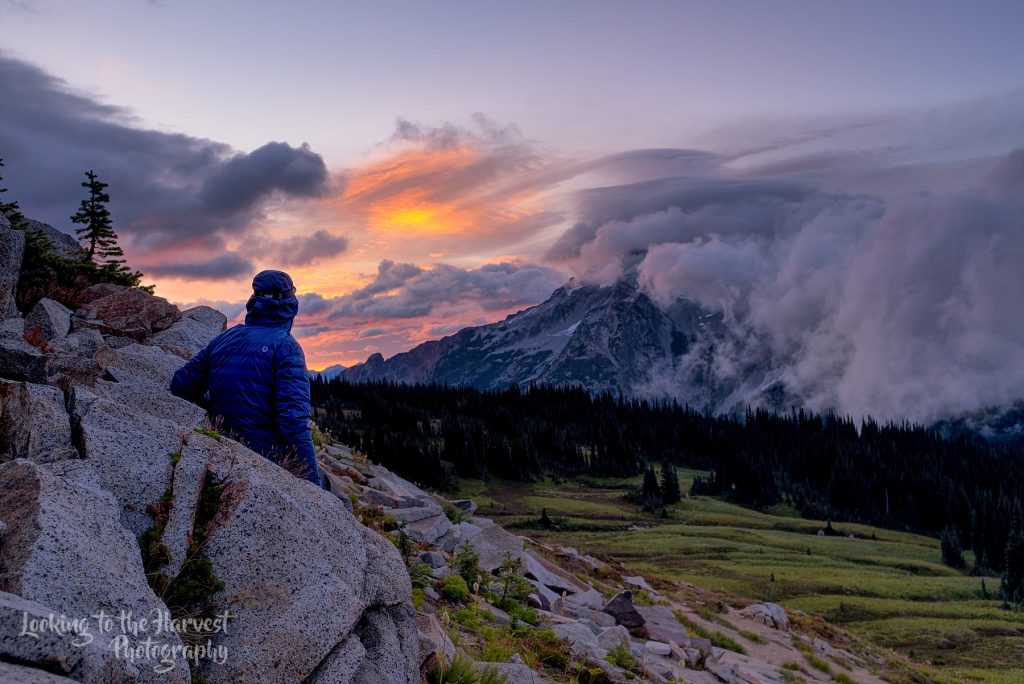Wrestling with Beauty and Loss

Despite the difficult circumstances leading up to our trip, the entire six days my husband and I repeatedly experienced the perfect timing of the Lord. The chance encounter with a hiker who pointed us to an amazing campsite. The decision to keep going one evening that enabled us to see more of the hike before the fog came in the following morning. The rain, that came on the day with our shortest distance. It all reminded us of the Lord’s sovereign control. Each day we hiked we reveled that this last-minute loop had everything we were hoping for and more.

Our trip was a needed gift to our weary souls, but I’ve found it challenging to merge our joy with the apocalyptic images of smoke I see on my news feeds. Why was our hike granted, while the hike (not to mention homes) of so many after us devastated?
I think we all wonder about this tension-perhaps especially now when the news cycle seems to brim with bad news. We rejoice in God’s faithfulness in our lives, and then grab our phones and see nothing but the hardship of others. Or perhaps we are the ones in the midst of the pain, while we watch prayers be answered for others. It’s a hard tension to hold.
As much as we joke about the unbelievable events of 2020, underneath it all I think we’re wrestling with questions. We know the goodness of the Lord because we’ve seen and felt it. We’ve seen the Lord answer prayers, offer protection, provision, and growth. It’s precisely because we’ve witnessed the Lord move that makes it harder when it looks like he isn’t.
It’s the same reason Job wrestled through his pain. As Ligon Duncan once said, Job didn’t wrestle because of unbelief, but precisely because he did believe in the Lord 1. He believed the Lord was good, all powerful, and sovereign. Because of that, he had trouble squaring his reality with those truths he understood.
And so we all do. We wrestle as we get to celebrate a new milestone of parenting, while a friend’s home burns. We wrestle as we thank God for providing grace to get through a project at work, while we pray for the relative who faced the last day of his job. We wrestle through the loss of the baby in our womb, while we celebrate the new life born to a friend. We wrestle as we experience joy right next to the deepest grief.
Elisabeth Elliot remarks on this strange tension as she worked through questions of her own husband’s martyrdom. She decided that she was sure God’s story will end well- “But not yet, not necessarily yet. It takes faith to hold on to that in the face of the great burden of experience, which seems to prove otherwise. What God means by happiness and goodness is a far higher thing than we can conceive.” ((Elliot, Elisabeth. Through Gates of Splendor, 266.))
Ultimately the way we must respond to the tension of any day in this life is to remember our limited perspective. God is God- not us. He is our Creator who holds infinite wisdom. A.W. Tozer points out that God’s wisdom means that “not only could His acts not be better done: a better way to do them could not be imagined.” (( Tozer, A.W. The Knowledge of the Holy, ))
And so we trust the God of all wisdom. We praise him for the good gifts he gives, and then we also trust the promise that says God does work all things together for good according to those who love him (Rom. 8:28). We rejoice in the beauty around us, but in our grief we trust that he who did not spare his own Son for us will graciously give us all that we need (Rom. 8:32). In the tension, we trust that everything is in subjection under the feet of Christ, though we do not see it completely now (Heb. 1:8-9).
I imagine we are all holding some joy right up next to some grief. Maybe you’ve rejoiced over the answered prayers in one relationship, only to be brought to tears by the struggles of another. Why won’t God move visibly in both? I don’t know. But he knows. He always does. And he is more than able, wise, merciful, and gentle to be entrusted with it all.

- Reformed Theological Seminary Lecture Series on Covenant Theology. [↩]

